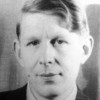That in the Heavens no gods there be
Selius affirms, and proves, ’cause he
Still thinking so lives happily.[Nullos esse deos, inane caelum
Adfirmat Segius: probatque, quod se
Factum, dum negat haec, videt beatum.]Martial (AD c.39-c.103) Spanish Roman poet, satirist, epigrammatist [Marcus Valerius Martialis]
Epigrams [Epigrammata], Book 4, epigram 21 (4.21) (AD 89) [tr. May (1629)]
(Source)
(Source (Latin)). Alternate translations:
That heav'ns are voide, & that no gods there are,
Rich Paulus saith, and all his proofe is this:
That while such blasphemies pronounce he dare,
He liveth here in ease, and earthly blisse.
[tr. Harington (1618), ep. 110 (Book 2, ep. 14), "Against an Atheist"]
Selius affirms, in heav'n no gods there are:
And while he thrives, and they their thunder spare,
His daring tenet to the world seems fair.
[tr. Killigrew (1695)]
Selius asserts, there is no providence:
Anmd what he thus asserts, he proves from hence;
Tht such a villain as himself still lives;
And, what is more, is courted too, and thrives.
[tr. Hay (1755)]
A Selius swears there is no god,
And thus attests an oath so odd.
Heaven has no habitant, quoth he;
Else how could heaven so smile on me?
[tr. Elphinston (1782), Book 7, ep. 12]
That there's no God, John gravely swears,
And quotes, in proof, his own affairs;
For how should such an atheist thrive,
If there was any God alive?
[Anon., Westminster Review, 1853-04]
Selius affirms that there are no Gods, and that Heaven is empty; and he produces a proof of his assertion; viz. that while he denies all Providence, he beholds himself affluent.
[tr. Amos (1858)]
Selius affirms that there are no gods, and that heaven is empty; and thinks he has sufficient proof of his opinion in seeing himself become rich while he maintains it.
[tr. Bohn's Classical (1859)]
"There are no gods: heaven is empty," Segius asserts; and he proves it, for in the midst of these denials he sees himself made rich!
[tr. Ker (1919)]
When Segius declaims he knows
That Heaven is void and gods are not,
It is because his record shows
That knaves may have a prosperous lot.
[tr. Pott & Wright (1921), "The Test of Facts"]
"There are no gods," says Segius, "and the blue
Is void." He lives and thrives and proves it true.
[tr. Francis & Tatum (1924), ep. 169]
"There are no gods, and heaven's all a lie!
No gods," said Segius, "give a damn or care
What happens to us." And he must be right:
Today the rat's a multi-millionaire.
[tr. Marcellino (1968)]
Sergius swears by the hollow sky that there are no gods,
and the truth is plain, since he,
denouncing them, is wealthy as can be.
[tr. Bovie (1970)]
"The skies are empty
and the gods are dead,"
says Segius, the proof of which
is that he sees himself made rich.
[tr. Porter (1972)]
"God doesn't exist, there's no one in the skies,"
Says Segius. If it's justice he denies,
He's right: would he be wealthy otherwise?
[tr. Michie (1972)]
Segius declares that there are no gods, that the sky is empty; and proves it, for in the course of these denials he sees himself become a rich man.
[tr. Shackleton Bailey (1993)]
This darkling world he claims, with rue
Has run itself into a ditch.
And he can prove his thesis true:
In such a cosmos -- he is rich.
[tr. Wills (2007)]
Segius says there are no gods, no heaven.
The proof he offers? He's a rich man.
[tr. Kennelly (2008), "Proof"]
Segius asserts that there are no gods, that heaven is empty. And he’s the proof, because, even as he denies these things, he sees that he’s become prosperous.
[tr. @aleatorclassicus (2012)]
Segius claims there are no gods, the skies
are bare. He proves it, too: while he denies
the gods exist, he sees his fortune rise.
[tr. McLean (2014)]
Quotations about:
blasphemy
Note not all quotations have been tagged, so Search may find additional quotes on this topic.
In despair
they blasphemed God, their parents, their time on earth,
the race of Adam, and the day and the hour
and the place and the seed and the womb that gave them birth.
But all together they drew to that grim shore
where all must come who lose the fear of God.
Weeping and cursing they come for evermore.[Bestemmiavano Dio e lor parenti,
l’umana spezie e ’l loco e ’l tempo e ’l seme
di lor semenza e di lor nascimenti.
Poi si ritrasser tutte quante insieme,
forte piangendo, a la riva malvagia
ch’attende ciascun uom che Dio non teme.]Dante Alighieri (1265-1321) Italian poet
The Divine Comedy [Divina Commedia], Book 1 “Inferno,” Canto 3, l. 103ff (3.103-108) (1309) [tr. Ciardi (1954), l. 100ff]
(Source)
The damned at Charon's boat, waiting to cross the Acheron. (Source (Italian)). Alternate translations:
God and their parents they alike blasphem'd,
Cursing all human kind, the time, the seed
From when they sprang, and of their birth the place.
They crouded then, with horrid yells and loud,
Close to the cursed shore of bliss devoid:
Where ev'ry Mortal waits who fears not God.
[tr. Rogers (1782), l. 87ff]
Loud they began to curse their natal star,
Their parent-clime, their lineage, and their God;
Then to the ferry took the downward road
With lamentable cries of loud despair.
Then o'er the fatal flood, in horror hung
Collected, stood the Heav'abandon'd throng.
[tr. Boyd (1802), st. 22-23]
God and their parents they blasphem'd,
The human kind, the place, the time, and seed
That did engender them and give them birth.
Then all together sorely wailing drew
To the curs'd strand, that every man must pass
Who fears not God.
[tr. Cary (1814)]
God they blasphemed, their parents and their kind,
The place, the time, the seed prolifical,
That embryo sowed them, and to life consigned.
Then wailing loud, their troop they gathered all,
And back recoiled them to the baleful verge,
Ordained to men from godliness who fall.
[tr. Dayman (1843)]
They blasphemed God and their parents; the human kind; the place, the time, and origin of their seed, and of their birth.
Then all of them together, sorely weeping, drew to the accursed shore, which awaits every man that fears not God.
[tr. Carlyle (1849)]
Blasphemed their God, their parents, human kind;
The time when, the hour, the natal earth,
The seed of their begetting, and their birth.
Then all withdrew, who there together were,
Loudly lamenting, to the wicked shore,
Awaiting those who feared not God before.
[tr. Bannerman (1850)]
God they blasphem'd, their parents they blasphem'd,
The human race, the place, the time, the seed
Of their conception and nativity.
Then by one impulse driv'n they onwards rush'd
With bitter weeping to th' accursèd shore;
The doom of all who have not God in fear.
[tr. Johnston (1867)]
God they blasphemed and their progenitors,
The human race, the place, the time, the seed
Of their engendering and of their birth!
Thereafter all together they drew back,
Bitterly weeping, to the accursed shore,
Which waiteth every man who fears not God.
[tr. Longfellow (1867)]
They fell to blaspheming God and their parents, the human kind, the place, the time, and the seed of their begetting and of their birth. Then they dragged them all together, wailing loud, to the baleful bank, which awaits every man that fears not God.
[tr. Butler (1885)]
They cursed at God and at their parentage,
The human race, the place, the time, the seed
Of their begetting, and their earliest age.
Then all of them together on proceed.
Wailing aloud, to the evil bank that stays
For every one of God who takes no heed.
[tr. Minchin (1885)]
They blasphemed God and their parents, the human race, the place, the time and the seed of their sowing and of their birth. Then, bitterly weeping, they drew back all of them together to the evil bank, that waits for every man who fears not God.
[tr. Norton (1892)]
They fell to blaspheming God and their parents, the human race, the place, the time, the seed of their sowing and of their births. Then in all their thronging crowds, the while they loudly wailed, they gathered them back together to the accursed shore, that awaiteth everyone that hath no fear of God.
[tr. Sullivan (1893)]
Blasphemed they God himself and their own parents.
The human race, the place, the time, the sowing
O' the seed they sprang from, and their own beginnings.
Then they retreated, one and all together,
Bitterly weeping, to the brink accursèd
Which for all men who fear not God is waiting.
[tr. Griffith (1908)]
They blasphemed God and their parents, the human kind, the place, the time, and the seed of their begetting and of their birth, then, weeping bitterly, they drew all together to the accursed shore which awaits every man that fears not God.
[tr. Sinclair (1939)]
They blasphemed God, blasphemed their mother's womb,
The human kind, the place, the time, the seed
Of their engendering, and their birth and doom;
Then weeping all together in their sad need
Betook themselves to the accursed shore
Which awaits each who of God takes no heed.
[tr. Binyon (1943)]
God they blaspheme, blaspheme their parents' bed,
The human race, the place, the time, the blood
The seed that got them, and the womb that bred;
Then, huddling hugger-mugger, down they scud,
Dismally wailing, to the accursed strand
Which waits for every man that fears not God.
[tr. Sayers (1949)]
They cursed God, their parents, the human race, the place, the time, the seed of their begetting and of their birth. Then, weeping loudly, all drew to the evil shore that awaits every man who fears not God.
[tr. Singleton (1970)]
They were cursing God, cursing their mother and father,
the human race, and the time, the place, the seed
of their beginning, and their day of birth.
Then all together, weeping bitterly,
they packed themselves along the wicked shore
that waits for everyman who fears not God.
[tr. Musa (1971)]
They execrated God and their own parents
and humankind, and then the place and time
of their conception's seed and of their birth.
Then they forgathered, huddled in one throng,
weeping aloud along that wretched shore
which waits for all who have no fear of God.
[tr. Mandelbaum (1980)]
Then they blasphemed God and cursed their parents,
The human race, the place and time, the seed,
The land that it was sown in, and their birth.
And then they gatehred, all of them together,
Weeping aloud, upon the evil shore
Which awaits every man who does not fear God.
[tr. Sisson (1981)]
... cursing the human race,
God and their parents. Teeth chattering in their skulls,
They called curses on the seed, the place, the hour
Of their own begetting and their birth. With wails
And tears they gaterhed on the evil shore
That waits for all who don't fear God.
[tr. Pinsky (1994)]
They cursed God and their parents, the human race and the place and the time and the seed of their sowing and of their birth.
Then all of them together, weeping loudly, drew near the evil shore that awaits each one who does not fear God.
[tr. Durling (1996)]
They blasphemed against God, and their parents, the human species, the place, time, and seed of their conception, and of their birth. Then, all together, weeping bitterly, they neared the cursed shore that waits for every one who has no fear of God.
[tr. Kline (2002)]
And they cursed God, and cursed the human race;
they cursed their parents=, and their kith and kin;
they cursed their birth; they cursed its time and place.
Weeping and gnashing their teeth they all drew in
to that accursèd shore, which is the ate
of everyone who brings his soul to ruin.
[tr. Carson (2002)]
They raged, blaspheming God and their own kin,
the human race, the place and time, the seed
from which they'd sprung, the day that they'd been born.
And then they came together all as one,
wailing aloud along the evil margin
that waits for all who have no fear of God.
[tr. Kirkpatrick (2006)]
They blasphemed God, their parents,
the human race, the place, the time, the seed
of their begetting and their birth.
Then weeping bitterly, they drew together
to the accursèd shore that waits
for every man who fears not God.
[tr. Hollander/Hollander (2007)]
They cursed at God, the human race, their parents,
The place where they'd been born, and the time, and the seed
That gave them life and brought about their birth.
Then they crowded, all of them loudly weeping,
Down to the cursed, ever-barren shore
That waits for men who live as if God were sleeping.
[tr. Raffel (2010)]
They cursed their parents, God, the human race,
The time, the temperature, their place of birth,
Their mother's father's brother's stupid face,
And everything of worth or nothing worth
That they could think of. Then they squeezed up tight
Together, sobbing, on the ragged edge
That waits for all who hold God in despite.
[tr. James (2013), l. 136ff]
Whoever increases the sum of human joy, is a worshipper.
He who adds to the sum of human misery, is a blasphemer.
Robert Green Ingersoll (1833-1899) American lawyer, agnostic, orator
Speech to the Jury, Trial of C. B. Reynolds for Blasphemy, Morristown, New Jersey (May 1887)
(Source)
What is blasphemy? I will give you a definition; I will give you my thought upon this subject. What is real blasphemy?
To live on the unpaid labor of other men — that is blasphemy.
To enslave your fellow-man, to put chains upon his body — that is blasphemy.
To enslave the minds of men, to put manacles upon the brain, padlocks upon the lips — that is blasphemy.
To deny what you believe to be true, to admit to be true what you believe to be a lie — that is blasphemy.
To strike the weak and unprotected, in order that you may gain the applause of the ignorant and superstitious mob — that is blasphemy.
To persecute the intelligent few, at the command of the ignorant many — that is blasphemy.
To forge chains, to build dungeons, for your honest fellow-men — that is blasphemy.
To pollute the souls of children with the dogma of eternal pain — that is blasphemy.
To violate your conscience — that is blasphemy.
The jury that gives an unjust verdict, and the judge who pronounces an unjust sentence, are blasphemers.
The man who bows to public opinion against his better judgment and against his honest conviction, is a blasphemer.
Robert Green Ingersoll (1833-1899) American lawyer, agnostic, orator
Speech to the Jury, Trial of C. B. Reynolds for Blasphemy, Morristown, New Jersey (May 1887)
(Source)
Blasphemy is what an old mistake says of a newly discovered truth.
Blasphemy is what a withered last year’s leaf says to a this year’s bud.
Blasphemy is the bulwark of religious prejudice.
Blasphemy is the breastplate of the heartless.
And let me say now, that the crime of blasphemy, as set out in this statute, is impossible. No man can blaspheme a book. No man can commit blasphemy by telling his honest thought. No man can blaspheme a God, or a Holy Ghost, or a Son of God. The Infinite cannot be blasphemed.Robert Green Ingersoll (1833-1899) American lawyer, agnostic, orator
Speech to the Jury, Trial of C. B. Reynolds for Blasphemy, Morristown, New Jersey (May 1887)
(Source)
There are thousands of things in the Scriptures that everybody believes. Everybody believes the Scriptures are right when they say, “Thou shalt not steal” — everybody. And when they say “Give good measure, heaped up and running over,” everybody says, “Good!” So when they say “Love your neighbor,” everybody applauds that.
Suppose a man believes that, and practices it, does it make any difference whether he believes in the flood or not? Is that of any importance? Whether a man built an ark or not — does that make the slightest difference? A man might deny it and yet be a very good man. Another might believe it and be a very mean man. Could it now, by any possibility, make a man a good father, a good husband, a good citizen? Does it make any difference whether you believe it or not?
Does it make any difference whether or not you believe that a man was going through town and his hair was a little short, like mine, and some little children laughed at him, and thereupon two bears from the woods came down and tore to pieces about forty of these children? Is it necessary to believe that? Suppose a man should say, “I guess that is a mistake. They did not copy that right. I guess the man that reported that was a little dull of hearing and did not get the story exactly right.” Any harm in saying that? Is a man to be sent to the penitentiary for that? Can you imagine an infinitely good God sending a man to hell because he did not believe the bear story?
Robert Green Ingersoll (1833-1899) American lawyer, agnostic, orator
Speech to the Jury, Trial of C. B. Reynolds for Blasphemy, Morristown, New Jersey (May 1887)
(Source)
By force you can make hypocrites — men who will agree with you from the teeth out, and in their hearts hate you. We want no more hypocrites. We have enough in every community. And how are you going to keep from having more? By having the air free, — by wiping from your statute books such miserable and infamous laws as this.
Robert Green Ingersoll (1833-1899) American lawyer, agnostic, orator
Speech to the Jury, Trial of C. B. Reynolds for Blasphemy, Morristown, New Jersey (May 1887)
(Source)
You can stand with the lash over a man, or you can stand by the prison door, or beneath the gallows, or by the stake, and say to this man: “Recant, or the lash descends, the prison door is locked upon you, the rope is put about your neck, or the torch is given to the fagot.” And so the man recants. Is he convinced? Not at all. Have you produced a new argument? Not the slightest. And yet the ignorant bigots of this world have been trying for thousands of years to rule the minds of men by brute force. They have endeavored to improve the mind by torturing the flesh — to spread religion with the sword and torch. They have tried to convince their brothers by putting their feet in iron boots, by putting fathers, mothers, patriots, philosophers and philanthropists in dungeons. And what has been the result? Are we any nearer thinking alike to-day than we were then?
Robert Green Ingersoll (1833-1899) American lawyer, agnostic, orator
Speech to the Jury, Trial of C. B. Reynolds for Blasphemy, Morristown, New Jersey (May 1887)
(Source)
For thousands of years people have been trying to force other people to think their way. Did they succeed? No. Will they succeed? No. Why? Because brute force is not an argument.
Robert Green Ingersoll (1833-1899) American lawyer, agnostic, orator
Speech to the Jury, Trial of C. B. Reynolds for Blasphemy, Morristown, New Jersey (May 1887)
(Source)
All laws for the purpose of making man worship God, are born of the same spirit that kindled the fires of the auto da fe, and lovingly built the dungeons of the Inquisition. All laws defining and punishing blasphemy — making it a crime to give your honest ideas about the Bible, or to laugh at the ignorance of the ancient Jews, or to enjoy yourself on the Sabbath, or to give your opinion of Jehovah, were passed by impudent bigots, and should be at once repealed by honest men.
Robert Green Ingersoll (1833-1899) American lawyer, agnostic, orator
Some Mistakes of Moses, Sec. 3 “The Politicians” (1879)
(Source)
To make sure that my blasphemy is thoroughly expressed, I hereby state my opinion that the notion of a god is a basic superstition, that there is no evidence for the existence of any god(s), that devils, demons, angels and saints are myths, that there is no life after death, heaven nor hell, that the Pope is a dangerous, bigoted, medieval dinosaur, and that the Holy Ghost is a comic-book character worthy of laughter and derision. I accuse the Christian god of murder by allowing the Holocaust to take place — not to mention the “ethnic cleansing” presently being performed by Christians in our world — and I condemn and vilify this mythical deity for encouraging racial prejudice and commanding the degradation of women. (This comprehensive statement was arrived at by examining the statutes of those seven states that have remained in the Dark Ages, so that I might satisfy their definitions of blasphemy.)
James Randi (1928-2020) Canadian-American stage magician ("The Amazing Randi") and scientific skeptic. [b. Randall James Hamilton Zwinge]
Skeptic Magazine (1995)
Written in an unsuccessful attempt to garner an official charge of blasphemy from any of those seven states that still had such laws on the books.
‘But people, the ordinary faithful, are offended by crude comic blasphemies,’ voices are raised to tell me. Yes indeed. But what of my religion? I am a lover of truth, a worshipper of freedom, a celebrant at the altar of language and purity and tolerance. That is my religion, and every day I am sorely, grossly, heinously and deeply offended, wounded, mortified and injured by a thousand different blasphemies against it. When the fundamental canons of truth, honesty, compassion and decency are hourly assaulted by fatuous bishops, pompous, illiberal and ignorant priests, politicians and prelates, sanctimonious censors, self-appointed moralists and busy-bodies, what recourse of ancient laws have I? None whatever. Nor would I ask for any. For unlike these blistering imbeciles my belief in my religion is strong and I know that lies will always fail and indecency and intolerance will always perish.
Stephen Fry (b. 1957) British actor, writer, comedian
“Trefusis Blasphemes,” Loose Ends, BBC Radio 4 (1986)
(Source)
Reprinted in Paperweight (1992).
One can only blaspheme if one believes.
W. H. Auden (1907-1973) Anglo-American poet [Wystan Hugh Auden]
“Concerning the Unpredictable,” Forewords and Afterwords (1973)
(Source)
FAUSTUS: Blasphemy and prayer are one. Both assert the existence of a superior power. The first, however, with conviction.
Act as the wisest have acted before you, and do not commence your exercises in philosophy in those regions where an error can deliver you over to the executioner.
Georg C. Lichtenberg (1742-1799) German physicist, writer
Aphorisms, Notebook C, #16 [142] (1772-73) [tr. Hollingdale (1960)]
(Source)
Alternate translation: "Act as the wisest before you have acted, and do not begin your philosophical exercises where an error can deliver you into the hands of the executioner." [tr. Tester (2012)]
To me, at least, the greatest blasphemy in the world is not the denial of God’s existence, but the claim that we have a pipeline to Him, and that all other claimants are wrong. This assertion is what plunged the world into the bloodiest of wars in the past, and might well do so again if the zealots had their way.
Sydney J. Harris (1917-1986) Anglo-American columnist, journalist, author
“Strictly Personal” column (20 Jan 1985)
Reprinted in Clearing the Ground (1986)
Idiot, not to know
his days are numbered who would fight the gods!
His children will not sing around his knees
“Papà! Papà!” on his return from war.Ὅττι μάλ’ οὐ δηναιὸς ὃς ἀθανάτοισι μάχηται,
οὐδέ τί μιν παῖδες ποτὶ γούνασι παππάζουσιν
ἐκ πολέμοιο καὶ αἰνῆς δηϊοτῆτος.Homer (fl. 7th-8th C. BC) Greek author
The Iliad [Ἰλιάς], Book 5, l. 407ff (5.407-409) (c. 750 BC) [tr. Fitzgerald (1974), l. 467ff]
(Source)
Alt. trans.:
Not knowing he that fights with Heav’n hath never long to live,
And for this deed, he never shall have child about his knee
To call him father, coming home.
[tr. Chapman (1611), ll. 387-89]
No man who fights with gods will live long or hear his children prattling about his knees when he returns from battle.
[tr. Butler (1898)]
Know thou, whoe'er with heavenly power contends,
Short is his date, and soon his glory ends;
From fields of death when late he shall retire,
No infant on his knees shall call him sire.
[tr. Pope (1715-20)]
Infatuate! he forgets
That whoso turns against the Gods his arm
Lives never long; he never, safe escaped
From furious fight, the lisp’d caresses hears
Of his own infants prattling at his knees.
[tr. Cowper (1791), ll. 474-78]
Infatuate! nor does the son of Tydeus know this in his mind, that he is by no means long-lived who fights with the immortals, nor ever at his knees will sons lisp a father’s name, as he returns from war and dreadful battle.
[tr. Buckley (1860)]
Unknowing he how short his term of life
Who fights against the Gods! for him no child
Upon his knee shall lisp a father's name,
Safe from the war and battle-field return'd.
[tr. Derby (1864), ll. 463-466]
Verily he endureth not for long who fighteth with the immortals, nor do his children prattle about his knees when he is come back from war and the dread conflict.
[tr. Murray (1924)]
That man who fights the immortals lives for no long time, his children do not gather to his knees to welcome their father when he returns home after the fighting and the bitter warfare.
[tr. Lattimore (1951)]
Doesn't the son of Tydeus know, down deep,
the man who fights the gods does not live long?
Nor do his children ride his knees with cries of 'Father' --
home at last from the wars and heat of battle.
[tr. Fagles (1990), ll. 465-468]
Want is a master which can sometimes make
A man the gravest sacrilege commit.[Perché il bisogno a dispogliar gli altari
ra’ l’uom talvolta, che sel trova avere.]Ludovico Ariosto (1474-1533) Italian poet
Orlando Furioso, Canto 43, st. 90 (1532) [tr. Reynolds (1973)]
Alt. trans.: "For man, alas, will sometimes disarray / The altar, when he finds himself in need ...." [tr. Rose (1831)]
For telling a good and incisive religious joke, you should be praised. For telling a bad one, you should be ridiculed and reviled. The idea that you could be prosecuted for the telling of either is quite fantastic.
Rowan Atkinson (b. 1955) English actor, comedian, and screenwriter
Letter to The Times of London (Oct 2001)
(Source)
Regarding proposed legislation outlaw "incitement to religious hatred."
There is no great invention, from fire to flying, which has not been hailed as an insult to some god.
J.B.S. Haldane (1892-1964) English geneticist [John Burden Sanderson Haldane]
“Daedalus, or Science and the Future,” speech, Cambridge (24 Feb 1923)
(Source)
Well aware that the opinions and belief of men depend not on their own will, but follow involuntarily the evidence proposed to their minds; that Almighty God hath created the mind free, and manifested his supreme will that free it shall remain by making it altogether insusceptible of restraint; that all attempts to influence it by temporal punishments, or burthens, or by civil incapacitations, tend only to beget habits of hypocrisy and meanness, and are a departure from the plan of the holy author of our religion, who being lord both of body and mind, yet chose not to propagate it by coercions on either, as was in his Almighty power to do, but to extend it by its influence on reason alone; that the impious presumption of legislators and rulers, civil as well as ecclesiastical, who, being themselves but fallible and uninspired men, have assumed dominion over the faith of others, setting up their own opinions and modes of thinking as the only true and infallible, and as such endeavoring to impose them on others, hath established and maintained false religions over the greatest part of the world and through all time ….
Thomas Jefferson (1743-1826) American political philosopher, polymath, statesman, US President (1801-09)
“Virginia Statute for Religious Freedom,” Preamble (18 Jun 1779; enacted 16 Jan 1786)
(Source)
During final debate around the bill's passage:See Jefferson's discussion about a failed amendment to the preamble here.
- the first clause was struck, changing the beginning to "Whereas Almighty God ...."
- the phrase "and manifested his supreme will that free it shall remain by making it altogether insusceptible of restraint" was struck.
- the phrase "but to extend it by its influence on reason alone" was struck.
What is blasphemy? I will give you a definition; I will give you my thought upon this subject. What is real blasphemy?
To live on the unpaid labor of other men — that is blasphemy.
To enslave your fellow-man, to put chains upon his body — that is blasphemy.
To enslave the minds of men, to put manacles upon the brain, padlocks upon the lips — that is blasphemy.
To deny what you believe to be true, to admit to be true what you believe to be a lie — that is blasphemy.
To strike the weak and unprotected, in order that you may gain the applause of the ignorant and superstitious mob — that is blasphemy.
To persecute the intelligent few, at the command of the ignorant many — that is blasphemy.
To forge chains, to build dungeons, for your honest fellow-men — that is blasphemy.
To pollute the souls of children with the dogma of eternal pain — that is blasphemy.
To violate your conscience — that is blasphemy.
The jury that gives an unjust verdict, and the judge who pronounces an unjust sentence, are blasphemers.
The man who bows to public opinion against his better judgment and against his honest conviction, is a blasphemer.Robert Green Ingersoll (1833-1899) American lawyer, agnostic, orator
Trial of C.B. Reynolds for blasphemy (May 1887)
(Source)
Monty Python’s usual schoolboy humour is here let loose on a period of history appropriately familiar to every schoolboy in the West, and a faith which could be shaken by such good-humoured ribaldry would be a very precarious faith indeed.
Books that cannot bear examination, certainly ought not to be established as divine inspiration by penal laws.
John Adams (1735-1826) American lawyer, Founding Father, statesman, US President (1797-1801)
Letter to Thomas Jefferson (23 Jan 1825)
(Source)
How has the church in every age, when in authority, defended itself? Always by a statute against blasphemy, against argument, against free speech. And there never was such a statute that did not stain the book that it was in and that did not certify to the savagery of the men who passed it.
Robert Green Ingersoll (1833-1899) American lawyer, agnostic, orator
Trial of C.B. Reynolds for blasphemy (May 1887)
(Source)
An infinite God ought to be able to protect himself, without going in partnership with State Legislatures. Certainly he ought not so to act that laws become necessary to keep him from being laughed at.
Humor distorts nothing, and only false gods are laughed off their pedestals.
We despise all reverences and all objects of reverence which are outside the pale of our list of sacred things. And yet, with strange inconsistency, we are shocked when other people despise and defile the things which are holy to us.
If a man, holding a belief which he was taught in childhood or persuaded of afterwards, keeps down and pushes away any doubts which arise about it in his mind, purposely avoids the reading of books and the company of men that call in question and discuss it, and regards as impious those questions which cannot easily be asked without disturbing it — the life of that man is one long sin against mankind.
William Kingdon Clifford (1845-1879) English mathematician and philosopher
“The Ethics of Belief,” Part 1 “The Duty of Inquiry,” Contemporary Review (Jan 1877)
(Source)
All great truths begin as blasphemies.




















